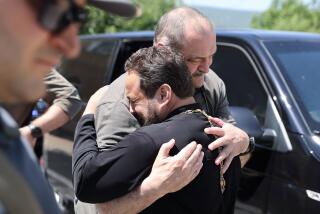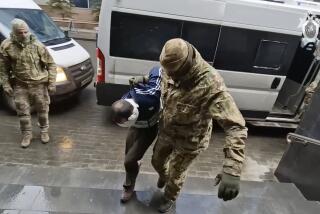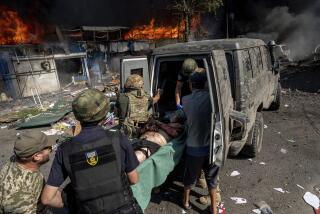As Russians Run Roughshod Over Caucasus, Resentment Turns to Hate
- Share via
PERVOMAYSKOYE, Russia — When Magomed Takovdina died in his sleep in nearby Terechnoye last month, fellow elders of the Muslim hamlet cautiously approached the masked Russian paratroopers cordoning off this Dagestani village.
Takovdina had been born in Pervomayskoye six decades ago, and by religious tradition he was to be buried in his native village by sundown.
But the Russian soldiers barred the funeral party without a flicker of regret, deeming their looming fight with Chechen guerrillas holed up in Pervomayskoye more important than the mourners’ need to follow their faith.
Takovdina was laid to rest in Terechnoye. His kith and kin chalked up another grievance against the hated Russians who have long imposed their will on the myriad minorities of the Caucasus Mountains.
“The Russians have never brought anything but trouble to us,” lamented Jusup Dibirov, who headed the thwarted burial delegation. “They have never understood our ways.”
Moscow’s war against rebellious Chechnya has run roughshod over the ancient customs and culture of the multiethnic Caucasus region since Russian President Boris N. Yeltsin sent in troops to quash the tumult in the breakaway republic 14 months ago.
But since the debacle last month at Pervomayskoye, where a Russian federal assault killed more Dagestani hostages than enemy gunmen, an always tense relationship between the Kremlin and its southern peoples has declined from weary resentment to poisonous hatred and vows of revenge.
Fear, deprivation and isolation have conspired to persuade the predominantly Muslim peoples of the Caucasus that Yeltsin is using their poor and powerless homeland to stoke ethnic frictions in a desperate attempt to stay in power.
Even in the hallowed halls of Moscow academia, suspicion is rife that the Kremlin eagerly engaged Chechens in neutral Dagestan in hopes of provoking a new conflict that would justify a state of emergency and postpone a presidential election that few believe Yeltsin can win.
“The latest steps by Yeltsin and his entourage bear witness to the fact that they are trying to aggravate the current situation in the Caucasus to boost their ratings on the eve of the presidential election,” said Dzhabrail D. Gakayev, a professor of Caucasus studies with the Russian Academy of Sciences. “He’s pandering to the patriotic sentiments of the electorate.”
Despite recent rumors of a peace initiative, analysts of the Kremlin’s military and ethnic policies believe that Yeltsin has taken a harder line against Chechen rebels in recent weeks in an attempt to persuade Russians that he is resolute enough to eradicate the guerrillas who have spread fear across the federation with a campaign of random terror.
In Pervomayskoye, the federal military machine deployed 10,000 troops to counter fewer than 300 Chechens. Despite that huge advantage and the utter disregard shown for the lives of the Chechens’ innocent captives, as many as half the gunmen slipped the federal cordon and got away.
Dagestani villagers watching in horror as the federal troops pounded Pervomayskoye with rockets and artillery shells saw the assault as evidence that Moscow considers those in the Caucasus more expendable than Russians.
When Chechen gunmen grabbed Russian hostages in the southern town of Budennovsk in June, Prime Minister Viktor S. Chernomyrdin allowed the guerrillas to escape unhindered in return for the safe release of the captives.
Here, though, the gunmen were ambushed before they could cross the border into Chechnya, prompting them to use the more than 100 Dagestani captives as a human shield during a four-day artillery bombardment.
“This crisis was resolved so ruthlessly because the victims were not Russians but Dagestanis,” importer Vazir Ismailov insisted, spurring a chorus of assent and fist-clenching from other ethnic Avars gathered around him.
Abdulkhalik Magomedov, 39, an economist educated in Moscow, accused the Kremlin of even more sinister motives, insisting: “The Russians want to pit the Dagestani peoples against the Chechens. Yeltsin is stirring up trouble in the Caucasus for his own benefit because, if a bigger war erupts, he can declare a state of emergency and rule for another five years.”
That is also the wary view of many analysts of ethnic relations in Moscow, where the president’s recent actions have sounded alarms among those still committed to democracy and reform.
Sergei A. Kovalev, Yeltsin’s human rights commissioner, resigned in protest against the Kremlin’s latest actions and denounced the president as a tool of power-hungry security men and bureaucrats.
The same week Kovalev resigned, Yeltsin replaced a moderate chief of staff with Nikolai D. Yegorov, the former nationalities minister who helped push the president into the December 1994 invasion and devised the brutal conquest of the Chechen capital, Grozny. Yegorov’s appointment was read by those in the Caucasus as a signal that the Kremlin plans to reignite the smoldering Chechen conflict to finally end the protracted war.
The hawkish turn of the president as campaigns for a June presidential election gain momentum was borne out by recent comments he made in an address to the upper house of parliament.
“Our position on solving this crisis is well known: patient dialogue with all willing to conduct political talks and unconditional, tough suppression of the bases of bandits and terrorists,” Yeltsin said in speaking to the Federation Council.
But analysts warn that Yeltsin is misreading the mood of the electorate and that, by stirring up new tensions, he could spark a wider war.
“Brandishing the military banner will prove disastrous for Yeltsin,” said Sergei A. Arutyunov, a Caucasus scholar at the Moscow Institute of Anthropology and Ethnology. “The Russian people do not want civil war and escalating conflict. They want stability and peace and a state ruled by laws.”
That is definitely the prevailing sentiment among the peoples of Dagestan, the poorest of Russia’s 89 regions and home to more than 30 ethnic groups in the desolate territory between Chechnya and the Caspian Sea.
Dagestanis accuse Moscow of benign neglect of their homeland in peacetime and willful misuse of the Caucasus as a venue for political war.
Peasants who know no system of survival aside from charity and barter decry their abysmal standard of living as a consequence of nearly two centuries of Russian domination.
From Pervomayskoye, the nearest telephone is at a post office more than 20 miles away. Most of the republic’s 1.8 million residents can spend a lifetime without encountering an indoor toilet or running water.
Seething over the spread of conflict from neighboring Chechnya into their territory and resentful of the Russians’ apparent attitude that people of the Caucasus are second-class citizens, the residents of Dagestan worry aloud that their future holds more violence and conflict.
“People from the Caucasus mean nothing to them,” Tagir Mikhailov, an unemployed construction worker, insisted angrily. “Here, we are just in the way of their war with the Chechens.”
More to Read
Sign up for Essential California
The most important California stories and recommendations in your inbox every morning.
You may occasionally receive promotional content from the Los Angeles Times.













